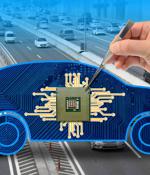Security News

Technology has entered all areas of life, and our cars are no exception. They have become computers on wheels, equipped with sensors, software, and connectivity that provide safety and comfort....

No room for your spy mobiles on our streets The US Commerce Department has decided not to wait for the inevitable, and today announced plans that would ban connected vehicle technology - and...

The automotive industry faces new cybersecurity challenges as vehicles become more connected. One way they can do this is by keeping their vehicle's software updated and using strong passwords for any connected services to reduce the risks of connected cars.

The likelihood of substantially more frequent, devious, and harmful attacks is portended by the complex attacks on connected cars that we have seen devised by industry researchers. How are attacks on tomorrow's connected cars likely to evolve?

In this Help Net Security video, Eve Maler, CTO at ForgeRock, discusses how digital identity can help create a more secure connected car experience and what car manufacturers should consider...

Cybersecurity researchers have discovered a security vulnerability that exposes cars from Honda, Nissan, Infiniti, and Acura to remote attacks through a connected vehicle service provided by SiriusXM. The issue could be exploited to unlock, start, locate, and honk any car in an unauthorized manner just by knowing the vehicle's vehicle identification number, researcher Sam Curry said in a Twitter thread last week. SiriusXM's Connected Vehicles Services are said to be used by more than 10 million vehicles in North America, including Acura, BMW, Honda, Hyundai, Infiniti, Jaguar, Land Rover, Lexus, Nissan, Subaru, and Toyota.

Japanese industrial giants NTT Communications Corporation and Denso Corporation have decided to start a business "To respond to the threat of increasingly sophisticated cyber-attacks against vehicles." The two companies have collaborated on vehicle security for a few years now, with NTT Communications bringing its consulting expertise around technologies such as networking, cloud computing, and managed infosec services such as building security operations centres for clients.

Car manufacturers require reliable connectivity and cybersecurity solutions to bring more convenience and secure services for drivers, passengers and automotive players. To build securely connected solutions and meet the requirements of new regulations such as UNECE WP29 , car makers can rely on Thales.

Analysts from Trend Micro rate DDoS attacks and electronic jamming as some of the highest cybersecurity risks for connected cars. A new report from Trend Micro analyzes a day in the travels of a connected car to identify the cyberattacks most likely to succeed.

Sadly, continued attacks against healthcare and medical infrastructure will probably lead to serious consequences going into 2021. While there have been no known attacks against over-the-air updates to vehicle software, it will become a growing concern as more manufacturers adopt the technology.